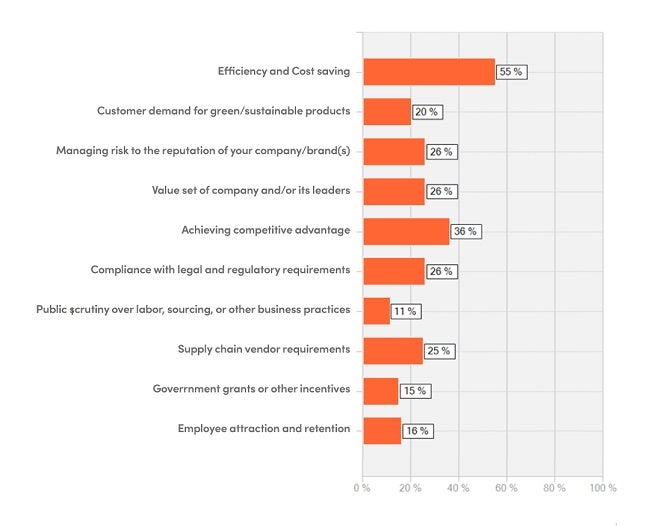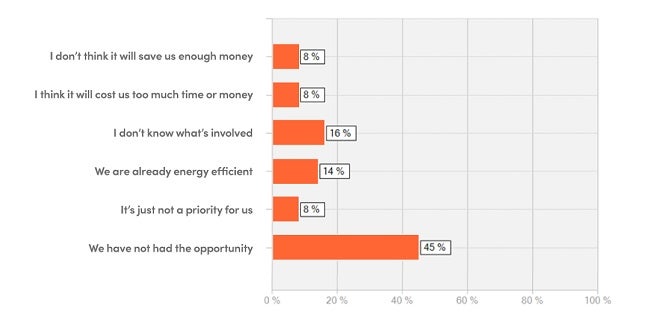The future of environmental sustainability for SMEs
If you’re looking to switch business energy, it could be because you want to save money, because you’re not happy with the service offered by your current supplier, or because you want a more sustainable energy supply.
But could going green bag you lower business energy bills and better service alongside a sustainable energy supply? And how big a part does renewable energy play in the future of sustainability for UK businesses? Let’s take a look…
What is sustainability in business?
Sustainability in business relates to the way your operations affect the economy, society and the environment - three pillars that are sometimes informally known as profits, people and the planet.
In order to run a sustainable business, you need to make a positive impact in one or all of those areas - the good news is that making your business environmentally sustainable has never been simpler, thanks to the technological advances that are making renewable energy cheaper and more accessible.

The results of a recent survey from Bionic* have highlighted that sustainability measures are becoming increasingly important to a growing number of small business owners, with more than three quarters (78%) reporting that they’re satisfied with the current levels of sustainability practices at their business. But what are the main drivers behind implementing sustainability measures?
Why do British businesses invest in sustainability?
As with most things in business, the balance sheet is a top priority, and extra energy efficiency measures can help save money - something that’s not lost on more than half (55%) of all business owners, who cite efficiency and cost-saving as their number one reason for investing in sustainability.

If your business can afford the initial outlay, then generating your own energy via a wind turbine or solar panels can help slash energy bills and hit renewable energy targets. But even putting some simple measures in place, such as fitting draught excluders around doors and windows and dropping the thermostat can make a difference.
Investing in sustainability can also give your business a competitive edge, especially if green credentials are important to customers, clients and vendors, and it can also help to manage risks to the brand or company’s reputation - if your company wants to be seen as ethically and environmentally responsible, it’s important to proactively encourage sustainability.
Again, simply signing up for a green energy deal is a good place to start and requires very little effort on your part - one quick call to 0800 280 8054 is all it takes to switch energy suppliers.

So far, so good. Until you consider that nearly two thirds (61%) aren’t currently on a green energy deal, more than three quarters (79%) of which have never even considered switching, which is arguably the simplest way to implement sustainability measures and should form the basis of any strategy.

Why aren’t more businesses switching to a green energy deal?
A lack of opportunity appears to be the biggest blocker, with just under half (45%) of business owners reporting that they have never been given the option to switch to a green tariff.

Although green electricity is now widely available, a lack of green gas options could be a stumbling block for a number of business owners, from salons that use a lot of gas for heating and hot water to restaurants and cafes that are powered by gas ovens.
Other reasons for not going green were that switching takes too much time (8%) and that it won’t save enough money (8%). This is where Binoic’s tech-enabled experts really can help out:
- We compare deals from our panel of trusted suppliers in a matter of minutes
- One quick call is all it takes to switch and save - you choose the deal, we do the rest
To see how much your business could save, give our tech-enabled team a call on 0800 280 8054 or enter your postcode on our business energy page and we’ll give you a callback.
Are green business energy deals more expensive?
When questioned about the cost of green energy tariffs, fewer than 5% of business owners believed they can cost less than other energy deals - so we decided to find out if that was actually the case.

All commercial energy deals are tailored to the needs of each specific business, and there are a wide range of factors that influence the rates each business pays for its energy supply, which means it’s difficult to say definitively whether green deals are cheaper or more expensive than other energy deals.
But there is growing evidence to suggest that renewable electricity is cheaper to generate than any power generated by fossil fuels. A report by the International Renewable Energy Agency (IRENA) has found that renewable electricity costs have fallen sharply over the past decade, driven by improving technologies, economies of scale, increasingly competitive supply chains and growing developer experience.
The report looked at cost data from 17,000 projects in 2019 and found that the costs achieved in more than half (56%) of all newly commissioned utility-scale renewable power generation capacity were lower than the cheapest fossil fuel-fired option.
And if there are any concerns about the capacity of green energy, consider that the start of 2020 saw renewable sources overtake fossil fuels for the first time in providing Britain's power, generating more than 40% in the first three months of the year.
Renewable energy has the capacity to meet the nation’s energy demands and is getting cheaper to produce - if energy suppliers decide to reflect this in lower-priced green tariffs, then there’s no reason why these deals should be any more expensive than standard energy deals.
If you’re considering greener energy, it could be worthwhile generating your own - to find out more, check out the Bionic guide to renewable energy, which outlines everything you need to know about what’s on offer, how much it costs and the kind of savings you can expect to make.
And if you don’t know enough about what a green energy deal can offer, here’s more on how they work and how they can help with your future sustainability measures.
How can a green energy deal help with sustainability?
The immediate benefit of a green energy deal is that you’re not relying on fossil fuels for power - this means fewer carbon emissions into the atmosphere and less reliance on the planet’s finite resources.
Business electricity has traditionally been generated by burning coal and gas to produce steam, which then spins a turbine to produce electricity. Green electricity, on the other hand, is generated by harnessing the power of sunlight, wind or water via solar panels, wind turbines or hydroelectric generators.
When it comes to green business gas, this is produced by a process called anaerobic digestion, which creates gas - or biomethane - from biodegradable materials. Unlike traditional fossil fuels, biomethane is renewable and virtually carbon neutral, which means it doesn’t contribute to climate change.
When you sign up to a green energy deal, your supplier will usually provide electricity that has been produced from 100% renewable sources. It could also be the case that some or all of the electricity you buy is 'matched' by purchases of renewable energy made by your supplier on your behalf. In either case, it’s a more ecologically sound way of powering your business.
But green gas is slightly more difficult to come by, as the technology isn’t quite as accessible. At Bionic, we work with Crown Energy, which is one of the few business energy suppliers offering commercial green gas tariffs, with gas supplied as either 100%, 50% or 25% biomethane.
Switching to a green energy deal is a simple way to do your bit for the environment, without having to fork out on any renewable energy tech - like solar panels - or address a culture change within the workplace - like switching off at the end of each day and ditching the printer.
On the downside, you’ll now need to tackle the additional problems posed by the coronavirus pandemic too.
How has coronavirus impacted environmental sustainability
Single-use non-recyclable items are causing an eco-emergency, with 380 tonnes of plastic produced globally each year. Given that 90% of the 8.3 billion tonnes produced over the last 60 years hasn’t been recycled, and that plastic takes around 400 years to decompose, you can see how we have a big problem on our hands.
The fact that fewer than half (47%) of UK businesses regularly use non-recyclable plastics is a good jumping-off point, but the coronavirus pandemic has thrown a major spanner in the works.
A growing number of businesses now need to use single-use items to adhere to new hygiene rules. It’s an issue that more than half (57%) of business owners are concerned about, and think it could affect their sustainability or green practices. In fact, a whopping 88% have already introduced single-use items - like gloves, gowns and masks - for staff, while 82% have done the same for customers.
It’s not just single-use plastics that are a problem though.
Although global carbon levels dropped significantly during lockdown, it managed to put a dent in the sustainability measures of those cafes, bars and restaurants that had to turn to delivery services in order to survive. More than three quarters (78%) said that a greater number of deliveries was impacting their carbon footprint.
Increased hygiene standards have also had an impact on sustainability, as more frequent laundry usage means more energy, water and detergents are being used - a problem cited by almost three-quarters (73%) of business owners, while 82% reported that increased deep cleaning practices were harming sustainability measures.
The pandemic undoubtedly has changed the way we work, potentially forever, but that doesn’t mean it should completely curb your business's future plans for sustainability.
What is the future of environmental sustainability for SMEs?
Education and cooperation should underpin the environmental sustainability plan of every UK business - going green is a team effort and it’s important to have everyone in your business pulling in the same direction.
Switching to a green energy deal is a good place to start - it’s an easy way to help cut your carbon footprint - but it needs to be backed up with additional measures.
The good news is that small changes can make a big difference - how many of these simple steps can you implement in your workplace?
- Cut down on travel - Cutting down the amount of time your employees spend getting to and from work is a great way to reduce emissions and increase productivity. Consider offering employees the chance to work from home, and use the web, conference call or video-conferencing services to keep on top of business matters and avoid unnecessary commuting. If employees have successfully worked from home during lockdown, why not keep things as they are.
- Turn everything off - If you’re back in the workplace, encourage employees to bring their energy-saving habits to work – if they switch off when they leave home, they can easily do the same at work. And make the most of the tech at your disposal – use your computers’ power management options so they shut down automatically, and install motion sensors on lights to make sure they only come on when rooms are in use.
- Stop using so much paper - Depending upon the nature of your business, you may find there’s little or no need to use the printer, whether at home or in the office. And you can file documents in virtual folders instead of physical filing cabinets. If you do need to print though, switch to double-sided printing and re-use one-sided copies for drafts and notepads.
- Start recycling everything - If you do find there is a surplus of waste paper, make sure it’s all recycled – even shredded documents can be recycled – if your local council can’t accept shredded documents, there should be a private service that can. And if you start using recycled paper in the office, and your business has 10 or more staff, this could have the same environmental impact as taking 35,000 cars off the road for one year. Keep recycling bins around the place, to encourage everyone to recycle at all times, and consider recycling computer equipment when your old systems reach the end of the line, it all helps to offset your carbon footprint.
- Adjust the thermostat - Turning the thermostat down by just 1°C can have a big impact on your carbon footprint, not to mention your business energy bills – but bear in mind offices should be heated top between 19°C and 21°C.
How to cut you
Cutting your carbon footprint is not only good for the environment, but it’s also good for your business energy bills too. But running a business energy comparison is the simplest way to save money and the only way to make sure you’re not overpaying for business gas and electricity.
To run an energy price comparison, give our tech-enabled experts a call on 0800 280 8054.
And don't forget, we can help with all your business essentials, including insurance, phone, broadband, and business loans.
*Bionic Survey of 100 UK SMEs carried out in September 2020








